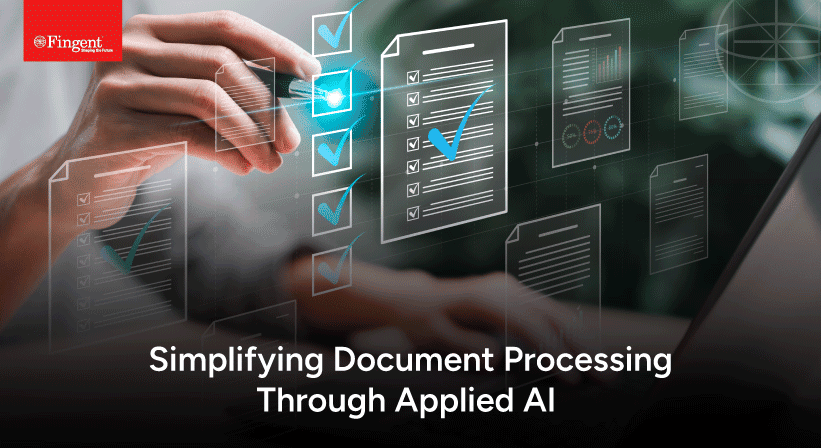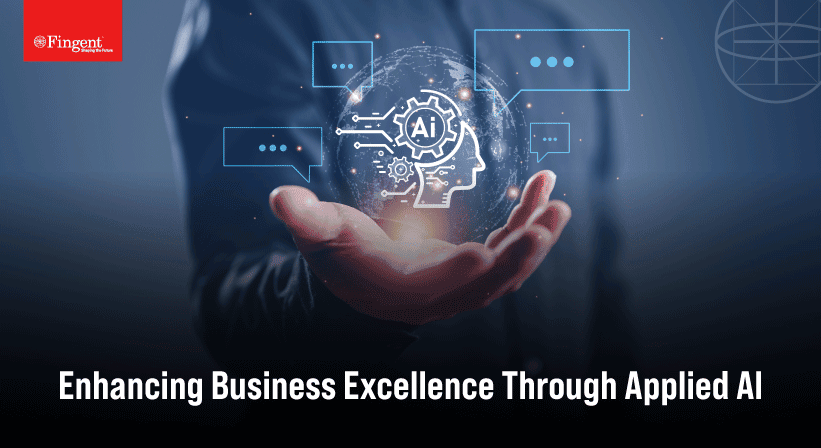The Future of Artificial Intelligence – A Game Changer for Industries
Warning: in_array() expects parameter 2 to be array, null given in /home/www/fingenttest/public/wp-content/themes/fingent/template-parts/content.php on line 37
Warning: in_array() expects parameter 2 to be array, null given in /home/www/fingenttest/public/wp-content/themes/fingent/template-parts/content.php on line 81
How is AI Transforming Various Industry Sectors?
From Siri to self-driving cars, Artificial Intelligence has been breaking into new realms, including industries that are late to adopt technology or that heavily rely on manual labor. Gartner predicts that by 2020, AI will produce more jobs than it displaces. By 2022, one in five workers engaged in mostly non-routine tasks will rely on AI to do a job.
The future of AI only looks bright!
According to experts, AI and the future of work will amplify human efficiency and productivity. AI may match or even surpass human intelligence and capabilities on tasks related to pattern recognition, complex decision making, sophisticated analytics, language translation, reasoning and learning, and speech recognition.
This article discusses how five major industries are benefiting from AI and its innovations.
1. Healthcare
No surprises here. AI in healthcare always comes first on the list. From doctors, surgeons, nurses to desk receptionists at clinics, Artificial Intelligence is enabling process automation across the healthcare community and ecosystem.
AI tools enable medical professionals to diagnose symptoms, identify trends, analyze data or information that would predispose a person to a particular disease.
AI-powered bots assist surgeons with heart, thoracic, and colorectal surgeries. Using bots for surgeries helps lower the risk of infection and blood loss, reduce pain, ensure higher accuracy, shorten hospital stays, and expedite recovery. Digitized health records (EHRs) help patients access their information on a shared online health portal.
Along with other technologies, Artificial Intelligence is being widely used in the ongoing fight against the COVID-19 pandemic. Remote patient monitoring using AI-powered medical equipment or devices help doctors maintain a safe distance from the patients, while offering treatment. The massive amounts of data generated every second in the field of medicine can be utilized effectively to continuously train AI systems through which these systems acquire the capabilities to generate insights that can aid medical researchers.
Read more: How Emerging Technology is Transforming the Healthcare Industry?
The future of AI in healthcare could include everything from answering the phone to interpreting radiology images, and designing therapeutic drugs.
2. Manufacturing
AI plays a key role in helping achieve better productivity, efficiency, and visibility across manufacturing operations. AI systems can transform the way organizations run their production lines, enhance human capabilities, garner real-time insights, and facilitate the design and product innovation.
Read more: Digital Transformation in Manufacturing
Following are some of the ways by which AI impacts the manufacturing sector:
- AI systems help monitor every stage of the production cycle and machine learning algorithms can be used to predict the fill rate, thereby optimizing the manufacturing processes and production planning.
- Small, lightweight “cobots” help create safer working environments. Manufacturers can adopt robotics to perform dangerous jobs, thus sparing their employees for crucial tasks, thereby avoiding occupational health hazards. Cobots are considerably less expensive and easy to program than the usual industrial robots. Soon, machine learning algorithms can improve their capabilities and help the cobots take instructions from humans and interact with them in a better way.
Read more: What Are Cobots and How Can They Benefit Industries?
- Predictive maintenance helps companies understand when machines need to be attended and serviced. Using machine learning, predictive maintenance can generate valuable data that helps prevent unplanned downtime. Sensors and advanced analytics in manufacturing equipment allow manufacturers to respond to alerts and resolve machine issues on time.
- Engineers or designers can input design goals and other parameters into generative design software (a program that generates several outputs to meet specific criteria) to explore better designs. Using machine learning, designers can learn from each iteration and understand what works and what does not.
3. Finance
According to a report by Business Insider Intelligence, about 75% of bank respondents with assets worth over $100 billion said that they are using AI technologies compared to the 46% of banks with assets less than $100 billion.
As much as $199 bn is saved for the front office and $217 bn for the middle office. AI technologies in banking can help generate over $250 billion in value. Considering the significant savings opportunities, more and more companies are implementing AI. Simply put, AI helps financial services companies mitigate risk, reduce overheads, and generate more revenue.
4. Education
Thanks to the numerous AI applications, the academic world is becoming more personalized. Today, a student can access study materials easily through computers and smart devices. AI helps automate administrative chores and minimizes the time required to complete complex tasks thereby allowing teachers to spend more time with each student.
Teachers can assess both multiple choice tests as well as written responses easily. Robots are helping create smart content such as video lectures and simulations as well as digitized textbooks that can be customized to the learning requirements. Along with the learning aids, these digitized interfaces help students of all academic ages and grades.
There is also a rising interest towards smart campus initiatives. A smart campus is a physical or digital set-up in which humans and technology- based systems come together to create and deliver automated experiences across higher education institutions.
AI is eliminating the boundaries of learning regardless of the physical locations. Today, students can learn any course from anywhere across the globe, at any time. AI-powered education helps nurture the fundamental IT skills of students and soon, there will be a wide range of highly interactive and personalized courses available online.
5. Retail
The retail and e-commerce industry has huge volumes of customer information, sales forecasting, stock and inventory to be tracked. Artificial Intelligence helps simplify data management to a large extent. For example, while searching for a product on an e-commerce application, AI recommends similar items according to your budget, color preference, purchase history, browsing data, online behavior, etc.
Cart abandonment is a common issue in the e-commerce industry which occurs when a customer adds items to their shopping cart but does not purchase them. With the help of chatbots and predictive analysts, the likelihood of cart abandonment can be reduced. Chatbots can remind your customer of the items left in their cart before they choose to navigate away.
Previously, people had to rely on the FAQ section of the website to get their questions answered. However, this included unchangeable questions and static answers and most customers were not satisfied with the answers. Today, however, it is changing. A chatbot agent can respond to questions using Natural Language Processing or NLP in a much better way and ensure that potential customers don’t abandon your website. Integrating voice search features into e-commerce applications helps offer a seamless digital customer experience.
Read more: How Will Artificial Intelligence Transform The World By 2030
Final Thoughts
Artificial Intelligence and machine learning together are promising to help transform every industry by guiding, organizing, and automating work. AI is definitely here to stay! At Fingent top custom software development company, we have the expertise to help businesses of all sizes including startups as well as established enterprises to gain an edge over competitors.
From suggesting products or providing basic customer service or running software tests, developing apps, and completing extensive problem-solving procedures for industries, we use AI technologies such as machine learning, natural language processing, and business rules that will provide you with optimal results. Get in touch with us to learn more.
Stay up to date on what's new

Recommended Posts

08 May 2024 Financial Services B2B
AI Shaping the Future of Financial Services: Use Cases & Applications
As Dan Schulman, the CEO of PayPal once said, “We're not trying to reinvent the wheel; we're trying to perfect it.” Achieving perfection is no easy process. It is not……

24 Apr 2024 B2B
A Leader’s Blueprint for AI Success
"Leaders, embrace AI! Make it your superpower!" - Robert Barber, Leadership Development Trainer and Executive Coach. How Are Businesses Using AI? The verdict is crystal clear—leaders today must embrace AI to……

18 Apr 2024 B2B
Applied AI For Document Processing
"It's becoming increasingly clear that AI is the future, and almost everything else is a sideshow." - World-renowned computer scientist Geoff Hinton AI has taken over almost every aspect of……

21 Feb 2024 B2B
Stepping The AI Revolution with Applied AI
“I am telling you, the world’s first ‘trillionaires’ are going to come from somebody who masters AI and all its derivatives and applies it in ways we never thought of.”……
Featured Blogs
Stay up to date on
what's new















 US
US Insurance
Insurance









































